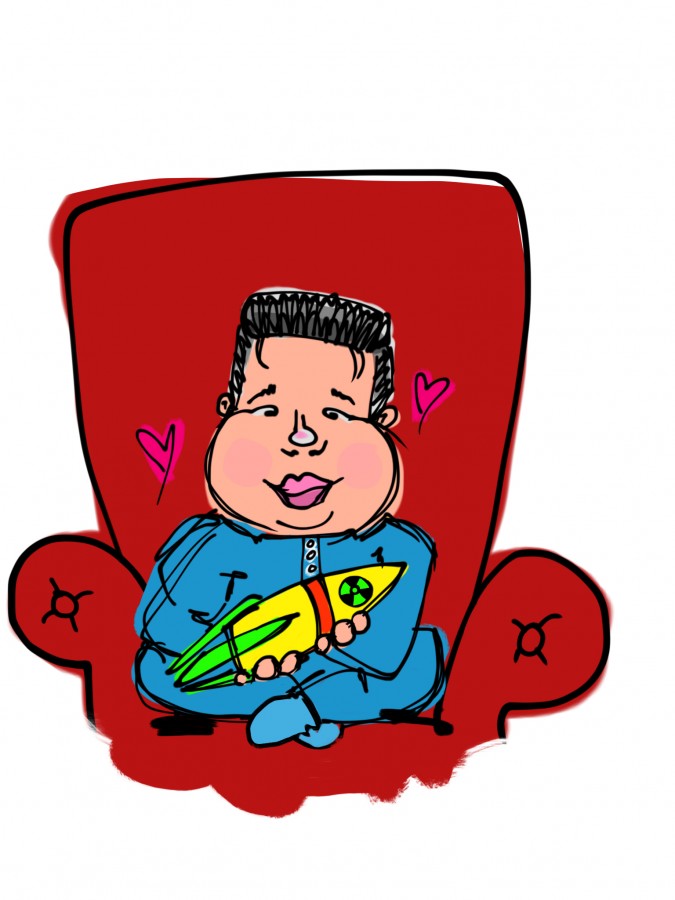Though North Korean legend has it that a double rainbow and a new shining star heralded the birth of Kim Jong Un as he rode in on clouds, the country itself is far from stellar. Plagued by poverty, repression of human rights and a tyrannical dictator, the inhabitants of Pyongyang live hungry and restricted lives.
The CIA World Factbook estimates that the annual GDP of North Korea stands at $1,800 per capita, which ranks it 197th in the world. Comparably, the people of South Korea just due South make 18 times as much.
Yet the crippled economy of North Korea extends to every innocent civilian within its borders. The World Food Program claims that one half of the country’s population of 24 million lives in “extreme poverty.” North Koreans are forced to subsist solely on corn and kimchi. Meanwhile, one in three children’s physical growth is stunted due to malnutrition. Electric power is sporadic and unreliable, flush toilets are rare and Internet is practically nonexistent.
Which leads us to only wonder: how did a third-world country come to dominate the headlines of the American media and plague the nightmares of foreign policy experts?
“I really think North Korea is a threat to the United States’ safety,” sophomore Liam O’Connor said.
Between its bold nuclear threats and new rumors of a hydrogen bomb, North Korea has become a hot topic on Capitol Hill, prompting legislators to determine if Pyongyang’s intimidation techniques are credible or not.
Though Kim may spread propaganda and fear throughout the United States, we as a nation should worry more about our reactions than their technological capability.
First, the recent dismay over a possible hydrogen bomb in the possession of the tyrant were quickly disproved by seismic technology specialists.
“Early reports of the seismic activity surrounding the test site in the country’s northeast suggest that it was a six kiloton test, roughly equivalent to the last test the North carried out in February 2013,” said Dr. John Nilsson-Wright, a professor of Japanese Politics and International Relations at Cambridge University. “A genuine H-bomb would most likely produce a much higher yield, and therefore technical specialists are skeptical about the North’s claim to have tested a fully-fledged hydrogen bomb.”
The 2016 tests for an H-bomb were not Kim’s only unsuccessful attempts. Just a decade ago, the Taepodong-2 missile allegedly had the potential to hit Alaska, but this missile test failed miserably.
It’s evident that North Korea’s loving nature for nuclear weaponry has not been loving in return.
Nevertheless, were Pyongyang to attain a working hydrogen bomb, or if the seismic experts are wrong, the United States would still not be in danger.
“Even if they built an H-bomb, North Korea’s engineers still haven’t tested a ‘re-entry vehicle,’” said Hans M. Kristensen, director of the Nuclear Information Project at the Federation of American Scientists. “They have only conducted three tests. It would take quite a few to advance the weapon to fly it in a missile.”
What does this mean for Kim Jong Un’s nuclear dreams?
Without a re-entry vehicle, North Korea’s nuclear warheads would simply disintegrate due to atmospheric heat as they sailed down to their target. Building an atomic bomb is one thing, but mobilizing it to reach the Western coast of the United States is something else entirely. Luckily for all Americans biting their nails with every new threat from North Korea, Pyongyang is years away from the ability to send a missile to the Western Hemisphere.
Sorry, Kimmy. Sitting merrily on mushroom clouds is an activity that will be limited to your dreams.
Nonetheless, countries in the Southeast Asian region are becoming increasingly fearful of North Korean aggression, due to their close proximity. Yet, that is where South Korea’s and Japan’s decades-long military reliance on the United States might be more of a blessing than a curse.
“The military bases in South Korea and Japan act as swift posturing mechanisms for the U.S. military and effective deterrents against North Korea,” said Brian Min, a Trinity Prep alumnus, Columbia student, and native South Korean. “Although North Korea might use these bases as propaganda for the North Korean regime, America can more easily strike and provide aid to U.S. allies threatened by North Korea in East Asia through those bases.”
The last thing we want or need is instability in Asia, and our bases allow us to not only monitor developments in Pyongyang’s technology, but to step in when our allies are threatened.
When it comes down to it, the United States has the largest nuclear arsenal and military in the world. Were Kim to follow through on his threats, he would only be pressing for his nation’s assured destruction.
“To put it in layman’s terms, if North Korea invades or directly attacks South Korea or the United States, the U.S. will come in and North Korea will go kaboom,” Min said.
We should remain vigilant in the face of North Korean nuclear adversity, yet it is no matter to lose sleep over. In light of the country’s lackluster economy, Pyongyang would not be able to financially sustain a nuclear war with the United States. Sending up a missile would be like writing a financial and physical death sentence signed “from Kimmy, with love.”
Instead, we ought to focus on other aspects of their aggression that pose a more immediate threat to citizens of the U.S.
“Americans should be concerned about North Korea’s cyber capabilities,” Min said. “North Korea has around 6,000 people in its cyber army and conducted a successful cyber attack against Sony last year… Since the U.S. cyber security system remains severely underfunded and ineffective, the U.S. must ramp up its cyber defense capabilities.”
Though we shouldn’t be expecting a missile in California any time soon, if ever, a cyber attack is a relevant and irrefutable possibility that must be addressed by American legislators. Until then, let’s remember that Kim isn’t the Boogeyman of our dreams.
“Kim Jong Un — the man who has a Swiss cheese addiction — is definitely more bark than bite,” Min said. “He is attempting to show the international community (unsuccessfully) that you shouldn’t mess with a guy who neither poops nor pees.”
Though Kim’s double rainbow origin story is fairly questionable, you don’t have to ask twice about his fictitious nuclear threats.










